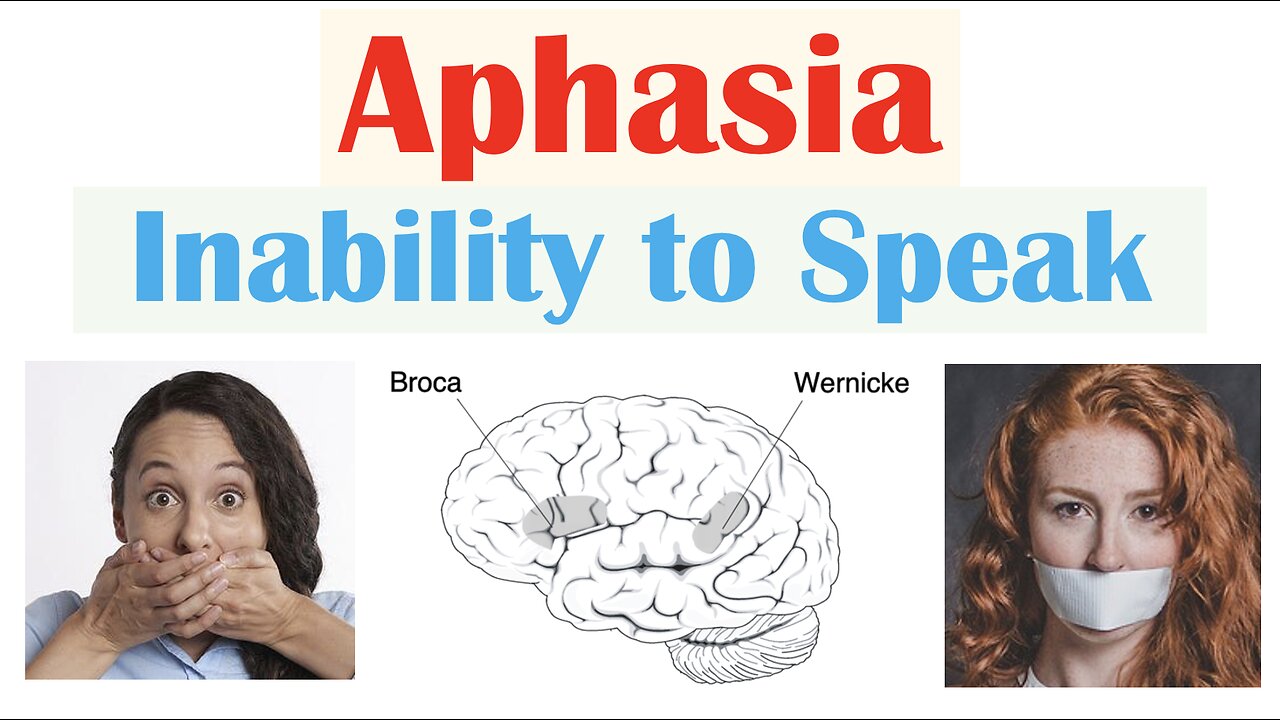Premium Only Content

Aphasia | Types (Broca’s, Wernicke’s, Global), Causes, Signs & Symptoms, Diagnosis, Treatment
Aphasia | Types (Broca’s, Wernicke’s, Global), Causes, Signs & Symptoms, Diagnosis, Treatment
Aphasia is an acquired cognitive condition involving a reduction, disruption or loss of ability to communicate (including speaking and understanding language). There are important language centers located in the brain, and these include Broca’s area, Wernicke’s area, the arcuate fasciculus and the angular gyrus. Damage or injury to these language centers can lead to a variety of different types of aphasia, including Nonfluent aphasia (Broca’s aphasia), Fluent aphasia (Wernicke’s aphasia), Global aphasia, Conduction aphasia, Transcortical aphasia and Anomic Aphasia. In this lesson, we discuss the brain anatomy and location of language centers in the brain, what causes injury or damage to these language centers, and we look at the signs and symptoms that occur with each type of aphasia.
I hope you find this lesson helpful. If you do, please like and subscribe for more lessons like this one!
JJ
**MEDICAL LEGAL DISCLAIMER**: JJ Medicine does not provide medical advice, and the information available on this channel does not offer a diagnosis or advice regarding treatment. Information presented in these lessons is for educational purposes ONLY, and information presented here is not to be used as an alternative to a healthcare professional’s diagnosis and treatment of any person/animal. Only a physician or other licensed healthcare professional are able to determine the requirement for medical assistance to be given to a patient. Please seek the advice of your physician or other licensed healthcare provider if you have any questions regarding a medical condition.
-
 1:08:29
1:08:29
TheCrucible
2 hours agoThe Extravaganza! Ep. 24 (8/19/25)
50.1K2 -
 1:27:30
1:27:30
Redacted News
3 hours ago"There will be consequences!!!" Trump issues big threat to Putin ahead of peace summit | Redacted
74.1K108 -
 DVR
DVR
Kim Iversen
2 hours agoIsrael DEMANDS X Remove Posts and X COMPLIES | Socialist Groceries Coming To A Store Near You!
23.6K45 -
 1:11:53
1:11:53
vivafrei
9 hours agoThe Great Replacement of American Truckers With Unskilled Foreign Labor - Live with Gord Magill
84.2K59 -
 1:05:13
1:05:13
Sarah Westall
2 hours agoEU Falling, United States Barely Hanging on - Strength and Courage Needed to Fight for Free Speech
27.5K3 -
 LIVE
LIVE
LFA TV
11 hours agoLFA TV ALL DAY STREAM - TUESDAY 8/19/25
1,009 watching -
 2:11:18
2:11:18
The Quartering
5 hours agoToday's Breaking News! Disgusting Grocery Shopping "Haul" Goes Viral, Las Vegas Collapse & More
100K33 -
 DVR
DVR
StoneMountain64
5 hours agoBest Extraction shooter is FINALLY on Console (+CoD Reveal Today)
53.7K -
 3:04:51
3:04:51
Due Dissidence
7 hours agoZelensky RETURNS To DC, HUGE Protests In Israel, Gal Gadot Blames Palestine For Flop, MSNBC Rebrands
44.7K21 -
 1:19:29
1:19:29
The HotSeat
3 hours ago🚨 Dems Swear Mail-In Voting Is “Secure”… Trump Says HELL NO 🚨
22.3K10